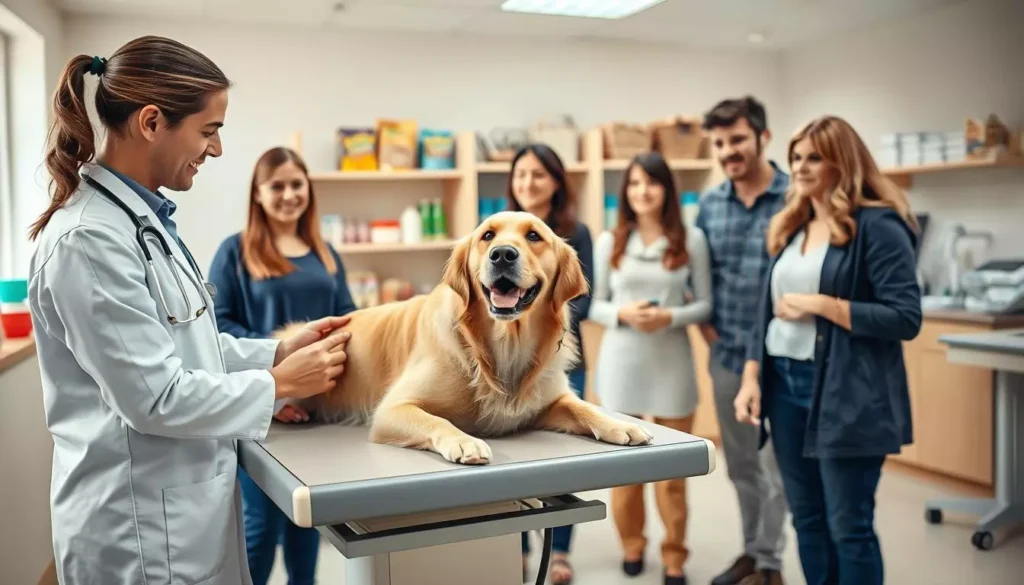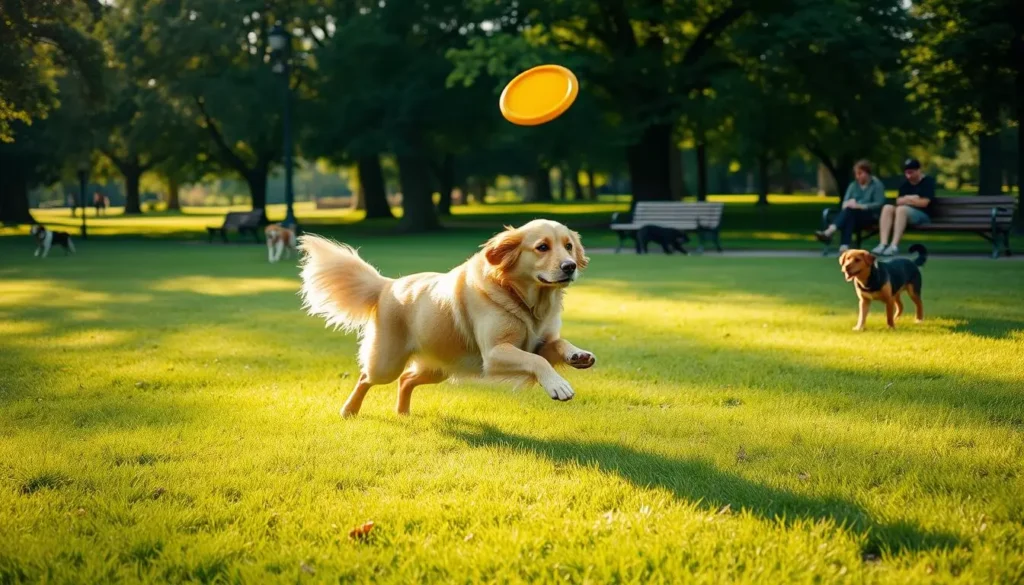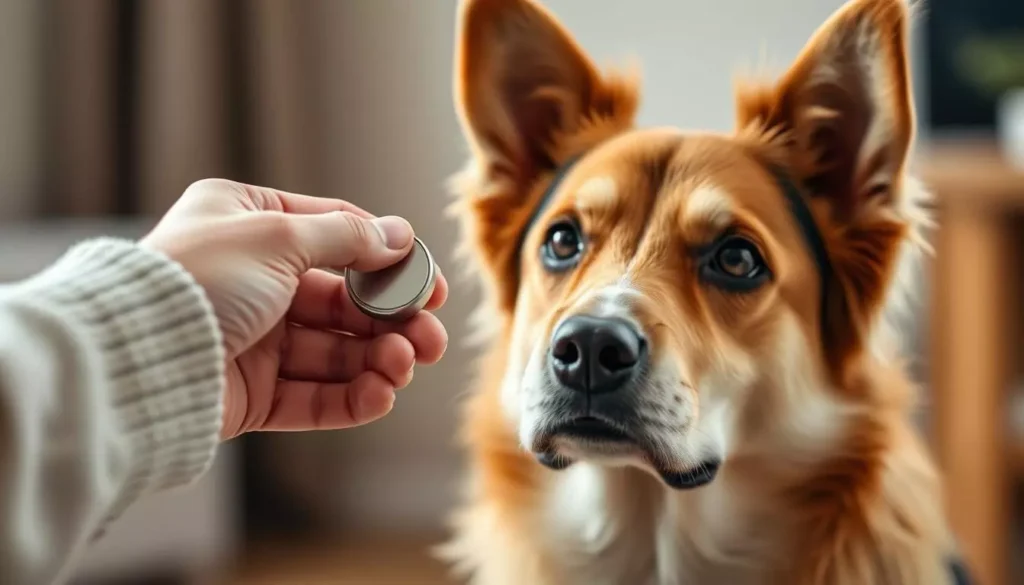As a devoted pet owner, we share a special bond with our dogs. This bond is filled with love and is pure. Every wag of their tail and bark brings joy and reminds us to care for them the best way we can.
Our journey with our dogs is filled with laughter and sometimes worry about their health. That's why I want to share important dog health tips. These tips will help our furry friends live happy and healthy lives. Together, we can make sure our dogs thrive in their golden years.
Key Takeaways
- Regular veterinary visits are crucial for maintaining your dog's health.
- Nutrition is a fundamental aspect of canine well-being; choose the right food.
- Preventative care, including vaccinations and parasite control, is essential.
- Understanding common health issues can help in timely intervention.
- Grooming and exercise are vital for both physical and mental health.
- Keeping your dog hydrated is critical for overall health.
- Consider pet insurance to manage health expenses effectively.
Importance of Regular Veterinary Visits
As a devoted pet owner, I know how crucial regular vet visits are for my dog's health. These visits help keep my dog healthy and happy for their whole life. They give us a chance to catch health problems early, which is key for keeping dogs well.
Understanding the Need for Annual Check-Ups
Every dog needs annual check-ups, no matter their age. Vets do detailed checks during these visits, looking at everything from weight to dental health. These exams help spot health issues early and keep my dog safe from common diseases. Regular vet visits are a big part of keeping my dog healthy.
What to Expect During a Veterinary Visit
When I take my dog to the vet, I know they'll get a full health check. The vet starts with a physical exam, checking skin, coat, and eyes. They also test for heartworms and parasites to keep my dog safe.
I love how these visits help us stay ahead of health problems. It lets my dog live a long, happy life.
Nutrition for Optimal Dog Health
Knowing how to feed your dog is key to their health and happiness. It's important to give puppies and adult dogs the right food at each stage of life. A good diet is vital for your dog's well-being, making choosing the right dog food a big decision.
Feeding Guidelines for Puppies and Adult Dogs
Puppies need more food than adult dogs because they grow fast and are full of energy. They should eat three to four meals a day, then switch to two meals as they grow up. Adult dogs usually do well with one or two meals a day.
Watching how your dog reacts to different foods can help. Good puppy or adult food has the right mix of proteins, fats, and carbs for their age. Start with the food maker's guidelines.
How to Choose the Right Dog Food
Choosing dog food means looking at your dog's age, weight, how active they are, and any health issues. I check the ingredients and choose foods with real meat and no fillers. Look at brands like Blue Buffalo, Wellness, or Hill's Science Diet for foods made for specific needs.
Adding fresh fruits and veggies can be good, but don't make up more than 10% of their diet. Doing research and talking to your vet can help you pick the best food for your dog.
| Dog Life Stage | Recommended Daily Meals | Top Brands |
|---|---|---|
| Puppy | 3-4 meals | Blue Buffalo, Royal Canin |
| Adult | 1-2 meals | Wellness, Hill's Science Diet |
| Senior | 1-2 meals | Purina Pro Plan, Nutro |
Preventative Care for Dogs
As a devoted pet owner, I know how important preventative care is for dogs. It keeps them healthy and safe from diseases and pests. By taking proactive steps, I can protect my furry friend from harm.

The Significance of Vaccinations
Dog vaccinations are key to keeping them safe. They guard against deadly diseases like rabies and parvovirus. Following a vet's vaccination schedule is crucial.
It's vital to know which vaccines are needed and why. Each vaccine boosts my dog's immune system. This helps it fight off infections.
Regular Flea, Tick, and Heartworm Prevention
Preventing fleas and ticks is also crucial. These pests can make my dog uncomfortable and spread diseases. I use monthly treatments and annual heartworm tests to keep my dog safe.
Talking to my vet helps me pick the right products for my dog. This ensures they get the best protection for their needs and lifestyle.
Understanding Common Dog Health Issues
As a dog owner, knowing about common health issues is key. Spotting illness signs early can make a big difference. It helps keep my dog healthy and happy.
Signs Your Dog May Need Immediate Attention
It's important to know when your dog needs urgent care. Look out for:
- Severe lethargy
- Loss of appetite or too much thirst
- Coughing or trouble breathing
- Vomiting or diarrhea that won't stop
- Signs of pain, like whining or acting differently
Quick vet visits are crucial when you see these signs. Fast action can greatly help your dog's recovery.
Managing Age-Related Conditions in Dogs
Older dogs face many health issues. These can affect their life quality. Some common problems include:
| Condition | Symptoms | Management Strategies |
|---|---|---|
| Arthritis | Stiffness, limping, not wanting to play | Pain relief, regular exercise, and keeping a healthy weight |
| Dental Disease | Bad breath, trouble eating, swollen gums | Regular dental visits and home care |
| Cognitive Dysfunction | Getting lost, changes in sleep, less interaction | Fun activities and medicine |
Regular vet visits are key for early disease detection. Keeping an eye on my dog's health helps manage their condition. This way, they can live a happy, comfortable life even with aging challenges.
Dog Allergies and Their Symptoms
As a dog owner, it's key to know about dog allergies. This is especially true if you see your dog coughing or gagging. Allergies can come from many things, like pollen or certain foods. Spotting these signs early can greatly improve your dog's health and happiness.
Identifying Allergies: Coughing and Gagging
Coughing and gagging can mean different things for dogs, but allergies are often the main cause. When dogs breathe in allergens, they might start coughing. Watching how your dog acts can help find out what's causing it:
- Seasonal pollen
- Dust mites
- Food ingredients like grains or specific proteins
- Fleas or ticks
If you see these signs, taking your dog to the vet is a good idea. They can figure out what's wrong and how to fix it. This can make your dog's life much better.
Are At-Home Dog Allergy Tests Accurate?
Some pet owners use at-home dog allergy tests because they're easy. But, they're not always right. Getting a real diagnosis usually means a vet visit and blood tests. Relying only on these tests can lead to confusion and the wrong treatment. It's best to talk to a vet to make sure your dog gets the right care.
Getting help from a vet can help find good ways to manage your dog's allergies. This can really help your dog feel better.
How to Tell if Your Dog is in Pain
As a dog owner, it's crucial to know how to spot pain in your dog. Dogs often hide their pain, so it's key to look for small signs. Knowing the signs of headaches and distress in older dogs can lead to quick vet visits.
Symptoms of Headaches in Dogs
Spotting headaches in dogs involves looking for specific signs. These include:
- Whining or whimpering
- Avoiding bright lights or noisy places
- Changes in sleep patterns
- Less interest in play or activities
Seeing these signs means I should act fast and get vet advice.
Recognizing Signs of Distress in Older Dogs
Older dogs may face pain that's hard to spot. It's important to know the signs of distress in them. Watch for:
- Confusion or disorientation
- Changes in eating habits
- Increased irritability or pulling away from others
- Unusual pacing or restlessness

Spotting these signs helps me support my dog's health and comfort. It shows the value of constant observation and vet visits.
Essential Grooming Tips for Healthy Dogs
As a dog owner, I know how key regular grooming is. It keeps our furry friends healthy and happy. Good grooming tips can really boost a pet's hygiene and well-being. We'll look at bathing frequency, nail trimming, and ear care.
How Often Should You Bathe Your Dog?
The right bathing schedule for dogs depends on their coat and lifestyle. Most dogs don't need baths often, maybe just a few times a year. But long-haired dogs or those outside a lot might need baths more.
It's important to watch your dog's needs. This way, you keep their coat clean and healthy without over-bathing. Too much washing can take away their natural oils.
Nail Trimming and Ear Care
Nail trimming is a must-do grooming task. It keeps your dog's paws comfortable and healthy. I suggest trimming nails based on how active your dog is. Active dogs might wear down their nails naturally but still need checks.
Ear care is also vital. Regular cleaning stops infections, especially in dogs prone to ear problems. Use a gentle cleaner on the outer ear to keep your dog comfortable and healthy.
The Importance of Training for Dog Health
Understanding the importance of dog training is key to ensuring my pet is well-behaved and mentally sharp. Regular training builds a strong foundation for good behavior and strengthens our bond. Basic obedience training teaches essential commands like sit, stay, and come, which are crucial for good habits.
Basic Obedience Training for Better Behavior
Basic obedience training is the first step to better dog behavior. By being consistent and using positive reinforcement, I can clearly communicate what I want my dog to do. This approach prevents confusion and behavioral issues, making outdoor activities safer.
As I teach my dog new commands, they learn to respond quickly. This leads to a more peaceful and harmonious life together.
How Training Affects Mental Health
Regular training sessions offer big mental health benefits for my dog. Dogs love mental challenges, and training keeps their minds active. Through different exercises, my dog becomes more focused and less anxious or bored.
Training also deepens our connection, making my dog happier and healthier.
| Training Aspect | Benefits |
|---|---|
| Basic Obedience Training | Enhances communication and promotes good behavior |
| Regular Sessions | Strengthens the bond and reduces anxiety |
| Mental Stimulation | Prevents boredom and encourages focus |
Dog Exercise: Keeping Your Pet Active
It's crucial to make sure my dog gets regular exercise. Dogs, like people, need daily movement to stay healthy and happy. The right amount of exercise depends on their breed, age, and health.
I try to mix up activities for my dog. This includes daily walks and fun play sessions.
Daily Walks: How Much Exercise Does Your Dog Need?
Dogs need daily walks as part of their exercise. On average, they need 30 minutes to two hours of walking each day. Smaller dogs might need less, while bigger or more energetic dogs might need more.
Walking with my dog is good for both of us. It's a chance for us to be active together and explore our surroundings.
Stimulating Play Activities for Dogs
There are many fun activities to add to a dog's exercise routine. Here are some of my favorites:
- Fetch: A classic game that encourages running and chasing.
- Agility Training: Setting up a course provides both exercise and mental challenges.
- Interactive Toys: These keep dogs busy and stimulate their minds, especially on days when walks may be shorter.
- Playdates: Socializing with other dogs can make exercise more enjoyable and fun.

Changing up these activities keeps my dog physically and mentally sharp. By offering a variety of experiences, I help my dog thrive and strengthen our bond.
Understanding Holistic Dog Health
Holistic dog health focuses on caring for the whole dog. It looks at their physical, mental, and emotional health. This approach uses natural remedies and a balanced diet to boost their well-being.
Benefits of Natural Remedies
Natural remedies can greatly improve a dog's health. Herbal supplements, for instance, can help with digestion, reduce stress, and boost the immune system. They often have fewer side effects than regular medicines.
Using these remedies can make your dog happier and healthier. It's a great way to care for your furry friend.
How Diet Plays a Role in Holistic Care
A good diet in holistic care is key to a dog's health. Eating whole foods can increase energy, improve coat health, and even mood. I love making recipes with fresh veggies, grains, and proteins for my dog.
This not only feeds my pet but also brings us closer. Cooking meals for them becomes a fun activity.
Monitoring Your Dog's Dental Health
Keeping my dog's teeth clean is key to their health. Regular dental cleanings help prevent dental disease. This is crucial to avoid serious health issues. I focus on both vet visits and daily dental care at home.
Importance of Regular Dental Cleanings
Dental cleanings for dogs are essential. They remove tartar and prevent gum disease. Without them, my dog could face serious health problems.
I schedule vet visits based on my dog's breed and age. This ensures they stay healthy.
At-Home Dental Care Tips
Along with vet visits, I practice at-home dental care. Here are some tips:
- Brushing my dog's teeth a few times a week with canine toothpaste helps remove plaque and reduces tartar.
- Providing dental chews that are specifically designed to clean teeth and freshen breath can make a significant difference.
- Using water additives that promote oral health is another easy way to support my dog’s dental care routine.
- Regularly inspecting my dog's mouth for signs of dental issues, such as bad breath or swollen gums, keeps me informed about their dental health.
Keeping Your Dog Hydrated
Keeping my dog hydrated is key to their health. Dogs need water for digestion and to stay cool. Knowing how much water they need is important, as it changes based on their age, size, and how active they are.
How Much Water Does Your Dog Need?
I aim for my dog to drink about one ounce of water for every pound of their body weight each day. This can change depending on their activity level and the weather. It's important to watch how much they drink and make sure they always have fresh water.
Ensuring Water Quality for Your Dog
Water quality is as crucial as the amount for my dog. I clean their water bowl often to keep it clean and safe. A simple wash with soap and water keeps it fresh and healthy for them.
The Role of Pet Insurance in Dog Care
As a dog owner, I know how vital it is to keep my furry friend healthy and happy. Pet insurance for dogs is often overlooked. It helps manage unexpected medical costs. Understanding different dog insurance plans is key to making smart choices for my dog and my wallet.
Why You Should Consider Pet Insurance
Pet insurance gives me peace of mind. It lets me focus on my dog's health without worrying about vet bills. A sudden illness or accident can be costly. Insurance prepares me for these unexpected expenses.
In my experience, insurance helps financially. It also encourages me to seek vet care quickly. This is because I'm not worried about the costs.
Understanding Different Insurance Plans
When looking at dog insurance plans, I found many options. Coverage and deductibles vary among providers. Some plans cover routine care, while others focus on accidents and illnesses.
Choosing the right plan for my dog's health needs is crucial. Insuring my dog when they're young and healthy is often the best choice. This way, I get the most out of pet insurance for dogs over time.
Dog Health: Recognizing When to Seek Help
It can be tough to know when your dog is sick. Knowing the signs that mean you need to take them to the vet is key. I've learned that spotting these symptoms early is crucial, especially in emergencies. Being aware of them can really help your dog stay healthy.
Common Signs of Illness in Dogs
There are many signs that your dog might not be feeling well. If they keep vomiting, have diarrhea, or seem really tired, it's a red flag. Changes in behavior, like not wanting to play or being really upset, are also warning signs. Other symptoms include:
- Refusal to eat or drink
- Excessive thirst
- Labored breathing
- Unexplained weight loss
Emergency Situations that Require Immediate Action
Some situations need quick action. If your dog is having trouble breathing, has been badly hurt, or is bleeding a lot, get them to the vet fast. Seizures and not responding are also emergencies. Remember, acting quickly can really help your dog.
Conclusion
Keeping your dog healthy means being proactive. This includes regular vet visits, a balanced diet, enough exercise, and preventative care. With the right dog health resources, any pet owner can create a healthy environment for their dogs. Essential health advice for dogs is key in our pet care journey.
Knowing how to care for our pets helps us meet their needs and catch health problems early. By focusing on these important health practices, we can make better choices for our dogs. This includes watching their diet and making sure they get enough exercise.
Our dedication to our dogs' health strengthens our bond and brings joy to their lives. With the right information and resources, we can give our dogs the best care. This ensures their happiness and well-being for many years.




